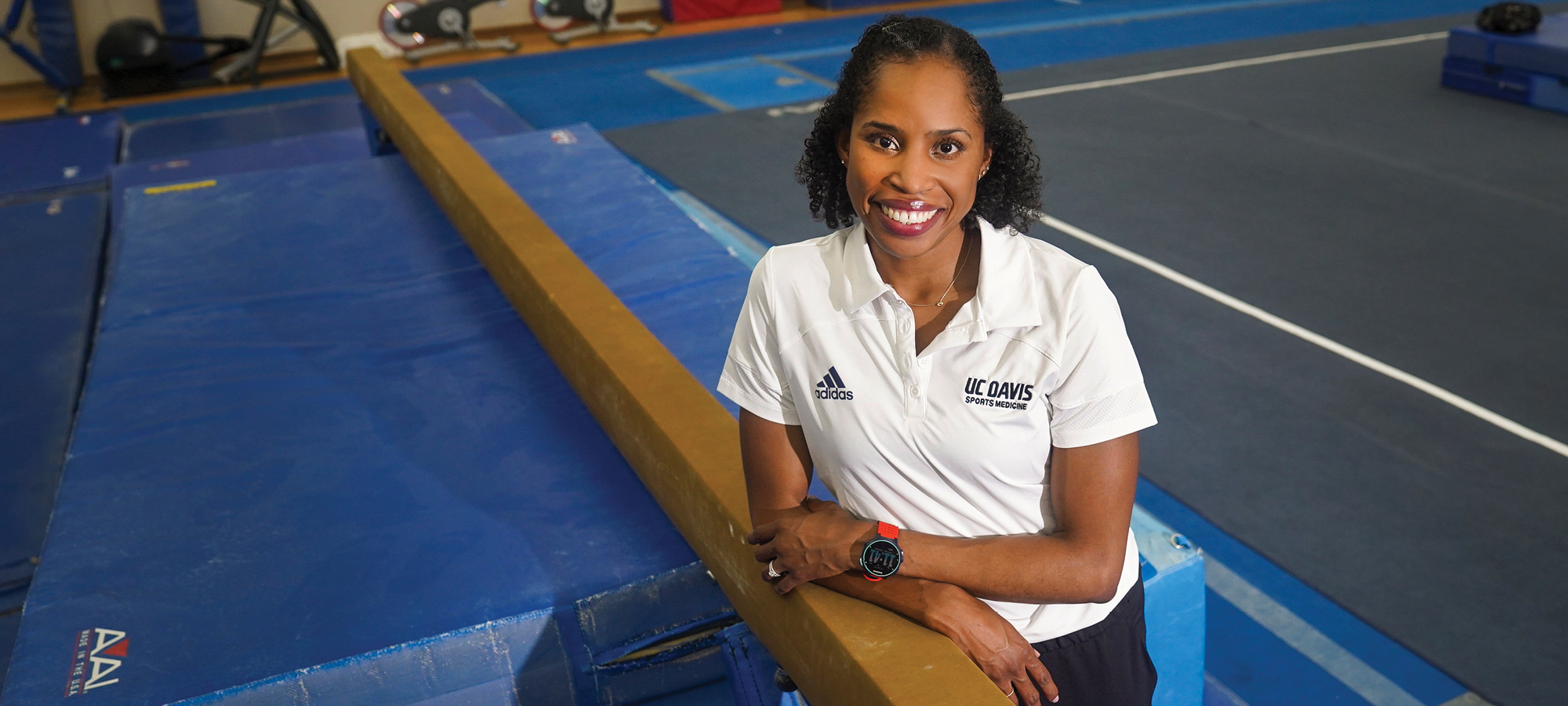
A former gymnast and avid fan of the sport, Marcia Faustin, MD’13, became co-head women’s team physician for USA Gymnastics in 2019. (Photography by Karin Higgins/UC Davis)
Marcia Faustin, MD’13, keeps America’s top gymnasts healthy.
This summer, as American gymnasts flipped their way to Olympic glory in Tokyo, their families couldn’t be there to watch—but USA Gymnastics women’s team physician Marcia Faustin, MD’13, was.
COVID-19 made for an Olympics unlike any other. There were challenges—strict pandemic protocols, Simone Biles’s struggle with a mental block, the US team’s unexpected second-place finish—and triumphs, including gold-medal performances from Jade Carey and Sunisa Lee and Biles’s openness in discussing and prioritizing her mental health.
Through it all, “we as the medical team had to really become part of their support system,” says Faustin. “You’re there to hug them when they’re having a hard time, and you’re there to hug them when they are feeling at the top of the world.”
Faustin considers both roles a privilege, one she has spent years earning. Growing up in the Chicago suburbs, she was always athletic, competing in volleyball and gymnastics and eventually as a Division I athlete in track and field at Loyola University Chicago. Studying nursing—her original plan—required clinical rotations her schedule as a student-athlete didn’t allow for, so Faustin set her sights on medical school instead.
At Loyola, Faustin got interested in sports medicine after shadowing her track and field team doctor. A scholarship brought her to the UChicago Pritzker School of Medicine in 2009. Today she works at the University of California, Davis, where she practices family and sports medicine, serves as assistant team physician for collegiate athletes, and teaches medical students and sports medicine fellows. She’s also a team physician for a professional soccer team, the Sacramento Republic FC.
Faustin has worked with athletes in a variety of sports, but gymnastics was always her favorite. So in 2017 she began volunteering with USA Gymnastics, providing medical care at meets around the country. Two years later, she and Ellen Casey of the Hospital for Special Surgery were appointed cohead women’s team physicians, a role that involves attending national team training camps every few months, traveling with the gymnasts to domestic and international meets, and keeping tabs on the athletes’ medical issues in between. During the COVID-19 pandemic, the physicians were also charged with developing protocols to keep athletes, coaches, and staff safe.
Being a team doctor means treating a little bit of everything—something for which Faustin’s family medicine training prepared her well. “It’s very broad in what you’re managing,” she says. Alongside every musculoskeletal ailment under the sun, “they get colds, they get migraines, they get abdominal pain.”
Sometimes, her job is to deliver news a gymnast least wants to hear: rest an injury, take time off practice, stop competing. With major injuries, the decisions are painful but more clear-cut. For smaller or chronic ones, there’s not always a right answer. That’s “the beauty of medicine, but also the challenge of medicine,” Faustin says. She often asks athletes who want to return to competition, “Can you protect yourself?” For a gymnast, that might mean the ability to safely take off, land, or fall; for a football player, the ability to block a tackle. Sometimes she encourages athletes to think about the future: if competing today means pain 15 years from now, is it worth it?
She’s also attentive to the gymnasts’ mental health. Viewers and fans “forget that they’re people first and they’re individuals first,” Faustin says. “We need always to remember that and respect that.” After all, she points out, they’re subject to the same stresses as everyone else—along with the pressure of being on an international stage.
Caring for the whole athlete has taken on added importance in the wake of a sexual abuse crisis that has prompted many people, both inside and outside of gymnastics, to reconsider the culture of the sport.
To build trust with her gymnast patients, Faustin focused on the basics of medicine. “I know that I’m taking care of the highest-level athletes,” she says, “but if you’re constantly thinking of them as VIPs, it’s harder to bring yourself down to just practicing good care.” That means listening well and making decisions collaboratively—with input from the athlete, parents, coaches, physical therapists, and other medical specialists—in support of the athlete’s health and goals.
While reaching the Olympics is a dream for many of the gymnasts on the 20-to-30-person national team, it’s not the only one that matters. Some gymnasts are hoping to make a World Championships team or earn a scholarship at a top-tier college, which can take just as much dedication and place just as much strain on the body. “We’re here to support their individualized goals,” Faustin says.
Tokyo was the first Olympics for Faustin and four of the six athletes on the women’s team. To reduce the risk of catching COVID-19, the US gymnasts and team staff opted to stay in a hotel instead of the Olympic Village. The atmosphere, Faustin says, was “similar to a dorm room.” The team even staged its own mini opening ceremony, complete with an American flag and a small procession.
In the end, every athlete under her and Casey’s care came home with a medal. “It is exciting and exhilarating to see the girls reach their goals,” she says. “That’s an amazing feeling and an amazing atmosphere to be part of.”
